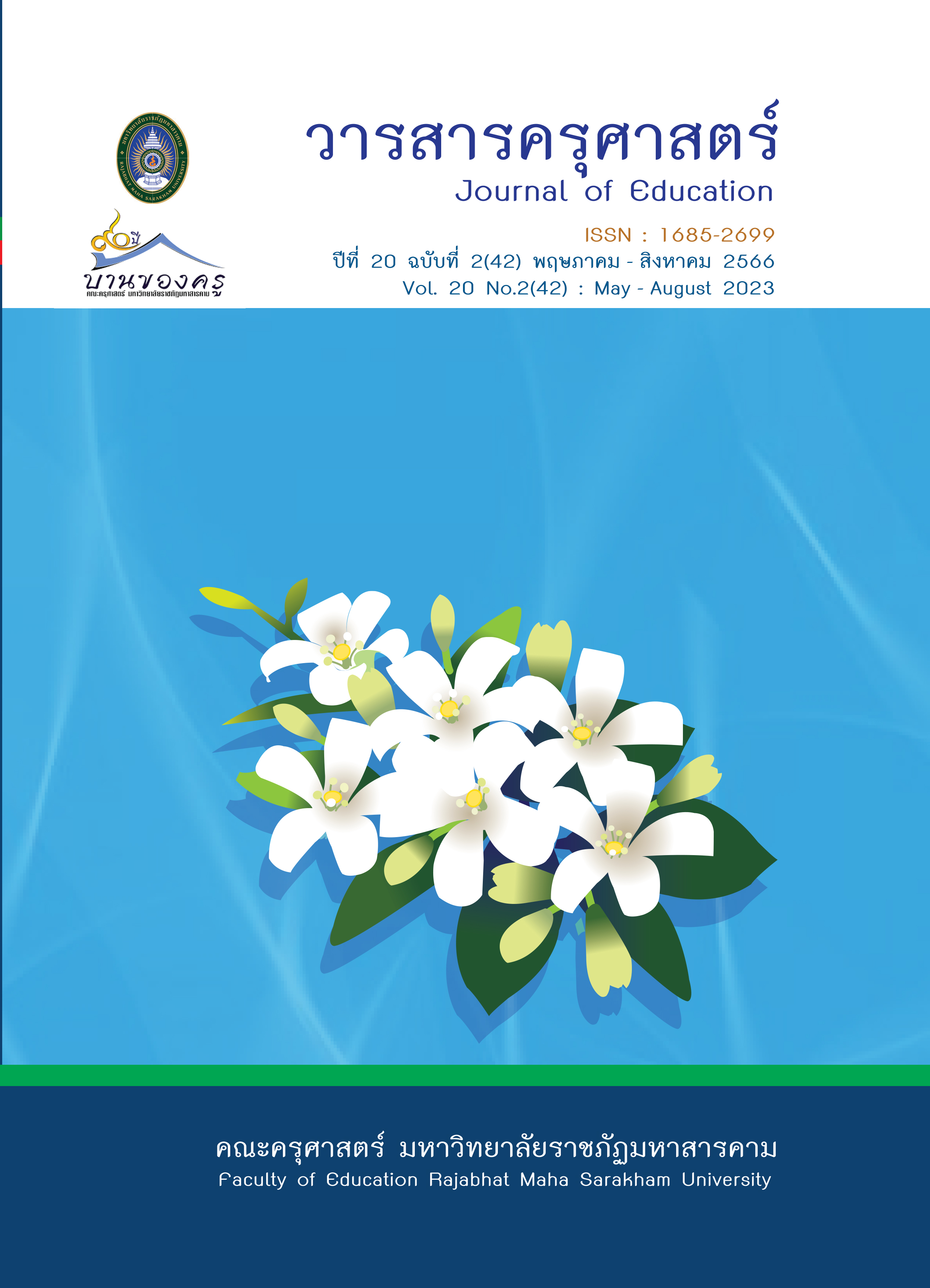Learning Management Using Virtual Laboratory Simulation on ‘Radiation Light’ to Promote Scientific Competencies and Scientific Attitudes of Grade 11 Learners
Main Article Content
Abstract
The objectives of this research were 1) to develop a learning management plan using virtual laboratory simulations about light; 2) to study the scientific competence of learners before and after learning using simulations in a virtual laboratory; and 3) to study scientific attitudes for learners before and after the learning management through virtual laboratory simulation. The study group were grade 11 students at the Roi Ed school in the first semester of the academic year 2021, there were 38 peoples. The research instruments were 1) 6 learning management plans using a virtual laboratory simulation on radiological lighting with 12 hours. 2) 15 items Scientific Competency Tests, and 3) 36 items Student’s Scientific Attitude Scale with 5-level estimator. The statistics used for data analysis were mean, percentage and standard deviation.
The results of the research were as follows: 1) The learning management plan by using virtual laboratory simulation on radiological light E1/E2 efficiency was at 77.49/83.68. 2) science competence of learners After being learning management using virtual laboratory simulation was at level 5 and 3) Learner’s Science Attitude by using simulating a virtual laboratory was at the highest level.
Article Details

This work is licensed under a Creative Commons Attribution-NonCommercial-NoDerivatives 4.0 International License.
ข้อกำหนดเบื้องต้นที่ผู้นิพนธ์(ผู้ส่งบทความ) ควรทราบ
1. ผู้นิพนธ์ที่ประสงค์จะลงตีพิมพ์บทความกับวารสาร ตั้งแต่เดือนมกราคม 2563 เป็นต้นไป ให้ใช้รูปแบบใหม่ (Template 2563) โดยสามารถดูตัวอย่างได้ที่เมนู GUIDELINES
2. จะตีพิมพ์และเผยแพร่ได้ ต้องผ่านการประเมินจากผู้ทรงคุณวุฒิ (Peer Review)
3. การประเมินบทความโดยผู้ทรงคุณวุฒิ (Peer Review) เป็นแบบ Double Blind
4. การอ้างอิงบทความใช้หลักเกณฑ์ APA (American Psychological Association) คลิก
5. บทความถูกปฏิเสธการตีพิมพ์ ไม่ผ่านการประเมิน ผู้นิพนธ์ขอยกเลิกเองหรือชำระเงินก่อนได้รับการอนุมัติ ทางวารสารไม่มีนโยบายการคืนเงิน
References
กระทรวงศึกษาธิการ. (2560). ตัวชี้วัดและสาระการเรียนรู้แกนกลางกลุ่มสาระการเรียนรู้วิทยาศาสตร์ (ฉบับปรับปรุง พ.ศ. 2560) ตามหลักสูตรแกนกลางการศึกษาขั้นพื้นฐาน พุทธศักราช 2551. โรงพิมพ์ชุมนุมสหกรณ์การเกษตรแห่งประเทศไทย.
จารุนันท์ พาภักดี. (2563). การพัฒนาสมรรถนะการแปลความหมายข้อมูล และประจักษ์พยานในเชิงวิทยาศาสตร์ของนักเรียนชั้นมัธยมศึกษาปีที่ 5 ที่ได้รับการจัดการเรียนรู้แบบสืบเสาะที่ขับเคลื่อนด้วยกลวิธีการโต้แย้ง [วิทยานิพนธ์ปริญญามหาบัณฑิต ไม่ได้ตีพิมพ์]. มหาวิทยาลัยมหาสารคาม.
บุญชม ศรีสะอาด. (2555). การวิจัยเบื้องต้น (พิมพ์ครั้งที่ 9). สุวีริยาสาส์น.
ประสาท เนืองเฉลิม. (2556). การเรียนการสอน. บริษัทวีพริ้นท์.
ปรียาภรณ์ ดำพะธิก. (2558). การสร้างเครื่องมือประเมินวินิจฉัยสมรรถนะทางวิทยาศาสตร์ของนักเรียนชั้นมัธยมศึกษาปีที่ 3 ตามแนวคิดการประเมินวินิจฉัยทางปัญญา [วิทยานิพนธ์ปริญญามหาบัณฑิต ไม่ได้ตีพิมพ์]. มหาวิทยาลัยบูรพา.
พจมาน เหล่าเจริญ. (2560). การพัฒนาบทเรียนบนเว็บแบบจําลองสถานการณ์ เรื่อง โครงสร้างของพืช วิชาวิทยาศาสตร์สําหรับนักเรียนชั้นประถมศึกษาปีที่ 4 [วิทยานิพนธ์ปริญญามหาบัณฑิต ไม่ได้ตีพิมพ์]. มหาวิทยาลัยราชภัฏมหาสารคาม.
พัฒน์ชนน คงอยู่, ภัทรภร ชัยประเสริฐ และศรัณย์ ภิบาลชนม์. (2562). การจัดการเรียนรู้โดยใช้กิจกรรมโครงงานเป็นฐาน เรื่องงานและพลังงานกรณีศึกษาโรงเรียนมัธยมวัดเขาสุกิม. วารสารแสงอีสาน, 16(2), 50-68.
ไพศาล วรคำ. (2562). การวิจัยทางการศึกษา (พิมพ์ครั้งที่ 11). ตักสิลาการพิมพ์.
ภัทราววรรณ ไชยมงคล. (2559). การวิจัยปฏิบัติการเพื่อพัฒนาความสามารถในการให้เหตุผลเชิงวิทยาศาสตร์ เรื่องปริมาณสารสัมพันธ์ของนักเรียนชั้นมัธยมศึกษาปีที่ 4 ด้วยรูปแบบการสืบเสาะที่ขับเคลื่อนด้วยกลวิธีการโต้แย้ง [วิทยานิพนธ์ปริญญามหาบัณฑิต ไม่ได้ตีพิมพ์]. มหาวิทยาลัยนเรศวร.
ศุภฤกษ์ คำแปล. (2558). การออกแบบและพัฒนาปฏิบัติการเสมือนสำหรับการเรียนรู้ เรื่อง เครือข่ายคอมพิวเตอร์ [วิทยานิพนธ์ปริญญามหาบัณฑิต ไม่ได้ตีพิมพ์]. มหาวิทยาลัยเทคโนโลยีสุรนารี.
สถาบันส่งเสริมการสอนวิทยาศาสตร์และเทคโนโลยี. (2555). การวัดและประเมินผลวิทยาศาสตร์. ซีเอ็ดยูเคชั่น.
สถาบันส่งเสริมการสอนวิทยาศาสตร์และเทคโนโลยี. (2557). คู่มือวัดและประเมินผลวิทยาศาสตร์. สถาบันส่งเสริมการสอนวิทยาศาสตร์และเทคโนโลยี (สสวท.).
สถาบันส่งเสริมการสอนวิทยาศาสตร์และเทคโนโลยี. (2564). ผลการประเมิน PISA 2018 การอ่านคณิตศาสตร์และวิทยาศาสตร์. สถาบันส่งเสริมการสอนวิทยาศาสตร์และเทคโนโลยี (สสวท.).
Sari, U., Hajiomer, A., Hassan, A. H., Guven, K., and Şen, O. F. (2017). Effects of the 5E Teaching Model Using Interactive Simulation on Achievement and Attitude in Physics Education. International Journal of Innovation in Science and Mathematics Education, 25(3), 20–35.


